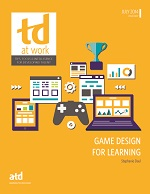TD Magazine Article
How to Choose the Right Games for Learning
Using games and gaming in learning is still a relatively new concept. Stephanie Daul outlines a variety of knowledge types, traditional delivery formats, and how gaming might be incorporated to teach a concept.
Tue Jul 08 2014

Using games and gaming in learning is still a relatively new concept. In the July 2014 TD at Work (formerly Infoline), Stephanie Daul outlines a variety of knowledge types, traditional delivery formats, and how gaming might be incorporated to teach a concept.
Declarative knowledge—information about something, such as facts, rules or definitions—often is delivered through presentations or knowledge checks. A trainer might consider using trivia games, puzzle games, or board games to teach the same concepts.
Principles, generalizations, or models are types of conceptual knowledge. Traditionally, such types of instruction have been presented through visual models, role play, or matching activities. Instead, puzzle games or matching games—we knew such games in our youth as Concentration and Memory—could be used.
Risk and Monopoly are two popular games that, if brought to the learning sphere, teach decision-making skills. This forces individuals to gather information to make an informed choice. Traditional delivery methods of this type of knowledge have included role play, observations, and simulations.
Communication and other soft skills enhance a person's ability to interact with others. Gaming elements that can teach these types of skills include team games, simulations, and role-playing games. Outside of work, you may recognize these types of interaction as Pictionary and Taboo.
These tips were adapted from the July 2014 TD at Work (formerly Infoline), "Game Design for Learning." Visit www.astd.org/Publications/TD-at-Work.
